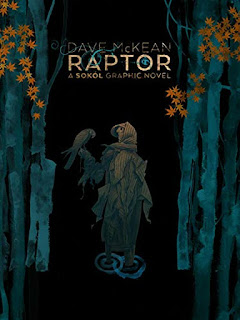I mean, this is still a world in which Cages exists, right? Surely he didn't do that as work-for-hire? (If he did, the world of comics is vastly more predatory and horrible than even I thought.) And there are original characters in things like Pictures That Tick and his smutty book Celluloid, as well. So I wonder if that phrase is just puffery to say "hey, this is important" or if it's using "creator-owned character" in the specifically comics sense of "a thing we expect to exploit in a lot of media for decades, starting now!"
In any case: Sokol! The sensational character find of 2021! A moody guy in a fantasy landscape who kills monsters, I think (mostly off-page) and then sometimes screws up handling the aftermath, letting the local villagers make things worse than the with-monster status quo!
Oh, and he's not really the main character of this book, because it's by Dave McKean, and nothing can be straightforward or not about the creation of art in a Dave McKean book. Arthur, who is some manner of late 19th century gentleman (he doesn't seem to have to work, or at least doesn't do anything in the course of this book) and who recently lost his lovely wife Amy, is writing the story of Sokol as a way to break his grief. His brother, Ed, would prefer that Arthur join his occult group instead, for the usual vague focus-your-mind and maybe transform-the-world aims.
The stories of Arthur and Sokol trade space on the page, with McKean's elegant - sometimes too elegant, since he's never seen a ten-dollar-word he couldn't replace with a fifteen-dollar one - prose as captions to give atmosphere and some context to their experiences. It's still McKean, though, so it's moody and evocative, with wordless sequences in which dark birds transform into blue women who fuck (?!) one of the main characters in what I hope is meant to be creepy rather than happy.
Raptor is not as clearly about grief as I thought it would be, with Arthur's mourning so central to it. Sokol does not seem to have lost anything, and his story has nothing to do with loss. The mystic rigmarole also does not seem to have anything to do with contacting the dead: it's more the 19th century equivalent of aligning one's chakras and becoming one with the numinous aether.
What we do get is a lot of scenes. Sokol tromps around, and may have been rewritten by Arthur (after meeting Arthur, because it's that kind of book) to create a better ending to his first major story. (Or maybe this ending will be even worse; such is life.) Ed and Arthur sit around like clubmen discussing Very Serious Things, and stand and declaim at Tarot cards with the rest of the mystic group. There are scenes that are clearly Meaningful and Symbolic and possibly even Mystic themselves. None of this forms a conventional narrative, because Dave McKean.
Frankly, like a lot of McKean's work, I don't bother to do all the work to figure out just exactly what it is about. It's moody and gorgeous and full of fancy words and fine feeling, and that's fine: it doesn't need to add up to anything. So I can tell you that I think McKean does intend it all to add up to something, but I could not tell you what that "something" is.
Perhaps the further adventures of this "creator-owned character" will give us all more context.

No comments:
Post a Comment